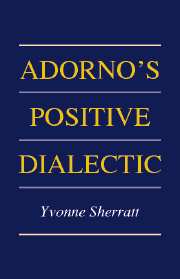Book contents
- Frontmatter
- Contents
- Preface
- Abbreviations
- Adorno's Positive Dialectic
- General Introduction
- PRELUDE TO ADORNO'S POSITIVE DIALECTIC
- Prelude I: Adorno's Intellectual Tradition: German Philosophy
- Prelude II: Adorno's Intellectual Tradition: Sigmund Freud
- ADORNO'S POSITIVE DIALECTIC: INTRODUCTION
- PART I NEGATIVE THESIS: THE DECLINE OF ENLIGHTENMENT
- 1 The Decline of Subjectivity: The Instincts
- 2 The Decline of Subjectivity: Narcissism
- 3 The Decline of Knowledge Acquisition
- 4 Knowledge Acquisition: A Negative Solution
- PART II POSITIVE THESIS: THE REDEMPTION OF ENLIGHTENMENT
- Bibliography
- Index
3 - The Decline of Knowledge Acquisition
Published online by Cambridge University Press: 10 August 2009
- Frontmatter
- Contents
- Preface
- Abbreviations
- Adorno's Positive Dialectic
- General Introduction
- PRELUDE TO ADORNO'S POSITIVE DIALECTIC
- Prelude I: Adorno's Intellectual Tradition: German Philosophy
- Prelude II: Adorno's Intellectual Tradition: Sigmund Freud
- ADORNO'S POSITIVE DIALECTIC: INTRODUCTION
- PART I NEGATIVE THESIS: THE DECLINE OF ENLIGHTENMENT
- 1 The Decline of Subjectivity: The Instincts
- 2 The Decline of Subjectivity: Narcissism
- 3 The Decline of Knowledge Acquisition
- 4 Knowledge Acquisition: A Negative Solution
- PART II POSITIVE THESIS: THE REDEMPTION OF ENLIGHTENMENT
- Bibliography
- Index
Summary
INTRODUCTION
Having examined how enlightenment regresses to myth through an analysis of the instincts and structure of the self, let us focus upon the decline in knowledge acquisition itself. Whereas both our instinctual and structural analyses involved us in an assessment of both the substantive and instrumental spheres of existence, knowledge acquisition in enlightenment involves us in an assessment of the instrumental sphere only, as Adorno believes that enlightenment only recognises this as knowledge. We analyse instrumental knowledge acquisition internally to see how it is inherently unsustainable.
Following the pattern of Chapters 1 and 2, we see how Adorno builds upon Freud. First we depict Freud on the psychological processes involved in knowledge acquisition and we also depict Freud's rudimentary ‘epistemology’. Second, we see Adorno's appropriation of both these in Freud. Third, we examine knowledge acquisition in Adorno seeing how he connects Freud to his Hegelian-Marxist tradition. Specifically, Adorno uses the concept of representation, from his Freudian inheritance, and ‘identification’, from Hegelian-Marxism. Finally, we detail Adorno's critique of instrumental knowledge acquisition.
ADORNO: KNOWLEDGE ACQUISITION. ‘REPRESENTATION’
Adorno has a somewhat singular ‘epistemological’ approach. He in fact combines two traditions of understanding knowledge; the first, is the psychological approach of Freud. The second approach is the ‘ontological epistemology’ inherited from the Hegelian-Marxist tradition. Let us see, first, what Adorno inherits from Freud.
Freud: Knowledge Acquisition
What, according to Adorno, is the nature of enlightenment's form of knowledge acquisition, namely instrumental knowledge acquisition?
- Type
- Chapter
- Information
- Adorno's Positive Dialectic , pp. 111 - 125Publisher: Cambridge University PressPrint publication year: 2002



